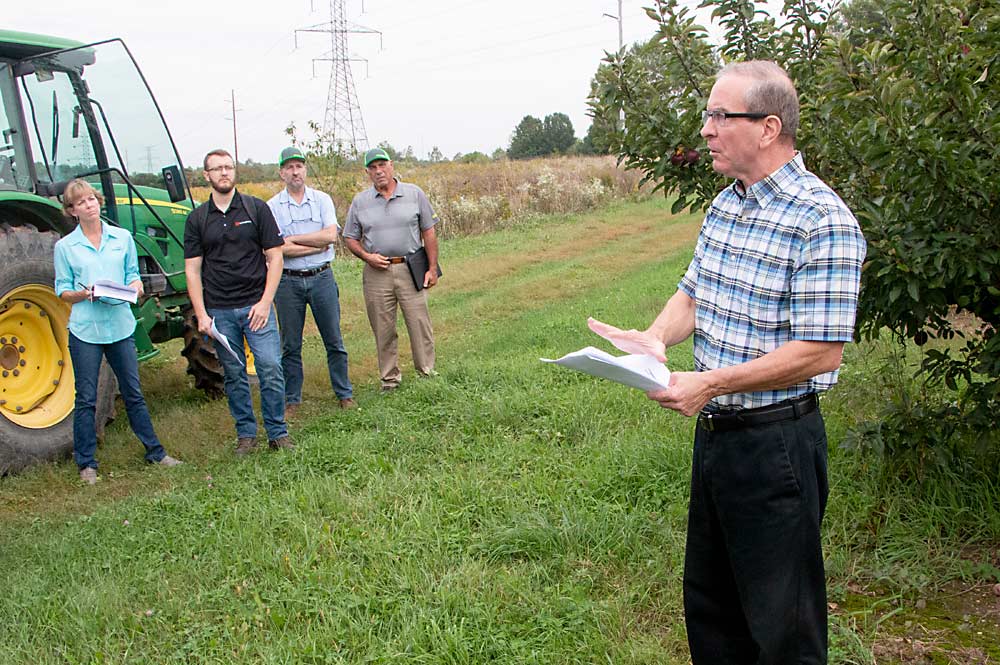
When it comes to controlling disease and insect pests of fruit crops, biopesticides have always played second fiddle to their conventional counterparts. But that trend is changing, as newer biopesticide products prove themselves more effective than earlier offerings.
Michigan State University entomology professor John Wise pointed out the greater presence of biopesticides in the various trials being conducted at MSU’s Trevor Nichols Research Center (TNRC) in western Michigan. Wise, TNRC’s research and extension coordinator, spoke during the center’s annual research field day on Oct. 1.
“Biopesticides are viewed favorably for IPM (integrated pest management) because of their safety profile for consumers, farmworkers and the environment,” he said. “But historically, biopesticides have had only limited presence in commercial fruit production, in part because of limited pest spectrum and weaker performance compared to conventional counterparts.”
Biopesticides were used primarily for organic production in the past, but the trend now is toward an integrated approach.
More recently, biopesticides are being rotated into fruit IPM programs with conventional pesticides to mitigate the risks involved with maximum residue limits on export-bound crops, Wise said. Using biopesticides strategically near harvest can give conventional products with longer residues more time to degrade.
“Following conventional products in a spray program also reduces the chances that a biopesticide will face severe pest pressure when being used,” he said. “This integrated approach is being tested more widely by universities and fruit growers, with hopes of an optimal balance of economics, crop protection and meeting standards for global export markets.”
Wise listed several new biopesticides being tested by MSU scientists that are showing promise for fruit IPM programs in Michigan and the entire Great Lakes production region:
—Spear-Lep (GS-omega/kappa-Hxtx-Hv1a) is a peptide-based biopesticide produced by Vestaron. It functions as a central nervous system inhibitor, and performance is enhanced when tank-mixed with Bacillus thuringiensis. Wise said Spear-Lep was included in a 2019 apple efficacy trial at TNRC and showed promising results for control of codling moth and other lepidopteran insect pests of apples.
—Grandevo (Chromobacterium subtsugae) and Venerate (Burkholderia rinojensis), both produced by Marrone Bio Innovations, are mixtures of metabolites produced by the bacterium during fermentation. Both products are labeled for pome and stone fruits, blueberries, caneberries, strawberries and grapes, and are listed by the Organic Materials Review Institute (OMRI) for use in organic production. Wise said both biopesticides have been included in several apple, cherry, grape and blueberry efficacy trials at TNRC over the past five years. Grandevo offered good results for control of many insect pests, including spotted wing drosophila, fruitworms, aphids and grape berry moth, while Venerate showed good results for control of insect pests including plum curculio, fruit worms, aphids and grape berry moth, he said.
—BoteGHA (Beauveria bassiana) is an entomopathogenic fungus that grows naturally in soils throughout the world and acts as a parasite on various arthropod species. BoteGHA is produced by Certis USA and is listed by OMRI for use in organic production. Wise said BoteGHA was included in 2019 apple and pear efficacy trials at TNRC and showed promising results for control of plum curculio and pear psylla.
—Sil-MATRIX (potassium silicate) is a Certis USA broad-spectrum biopesticide for use in a wide variety of fruit crops. Wise said Sil-MATRIX was included in apple efficacy trials over the past several years at TNRC and showed promising results for control of aphids and San Jose scale insects.
—VeratranD (Sabadilla) is an MGK botanical insecticide using sabadilla alkaloids as the active ingredient. VeratranD is not currently registered for use in pome and stone fruits or grape and berry crops, but these registrations are being pursued with help from the IR-4 Project, a group that works with regulatory agencies to facilitate registrations of pesticides on specialty crops. Wise said Sabadilla was included in blueberry efficacy trials over the past several years at TNRC and showed promising results for control of spotted wing drosophila and other insect pests. •
—by Matt Milkovich
Related:
—Let us (not) spray






Leave A Comment